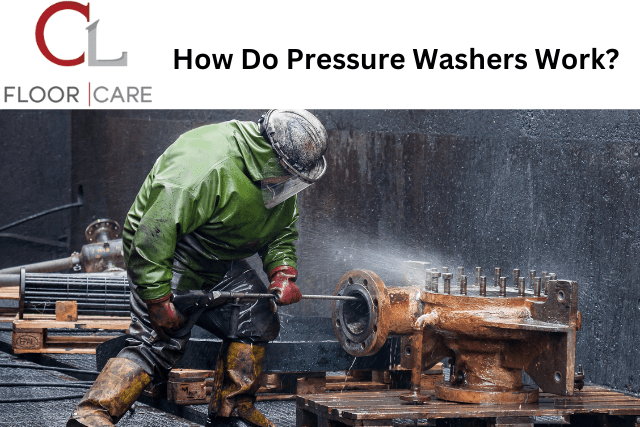How Do Pressure Washers Work?
A pressure washer is a piece of heavy-duty cleaning equipment that can be used to clean all manner of surfaces, generally outside. With a pressure washer, you can make quick work of cleaning concrete surfaces, spray off decking, or even wash your car. How does a pressure washer work exactly? In this guide, we’ll take a closer look at this popular type of cleaning equipment, as well how they work.
What is a Pressure Washer?
Pressure washers are made of several key components, including an inlet valve, water pump, high-pressure hose, trigger gun and nozzle, as well as an electric or gas engine. Pressure washers use a powerful motor to pump water from a supply, before forcing it out through a nozzle at incredibly high pressures.
When this water comes into contact with a surface, enough energy is released to get rid of stubborn dirt and other debris. The higher the pressure, the more effective a pressure washer is at cleaning surfaces.
Flow rate adjustments are also standard with most pressure washers. While a higher flow rate uses more water, it can significantly speed up the cleaning process.
How Does a Pressure Washer Work?
Although pressure washers might seem like complicated pieces of machinery, they’re surprisingly deceptive. Read on for a brief summary of how pressure washers work in practice:
- Water is fed into a water inlet valve (typically via a garden hose).
- A motor-powered water pump draws this water, before accelerating it and increasing the pressure. On average, pressure washers operate at settings of 1,300 to 1,700.
- Pressurised water is then released via the nozzle by using the trigger gun.
- Cleaning can now begin. Everyday pressure washers can process around 2 gallons per minute (GPM), while commercial equipment can process up to 10 gallons GPM.
Different Types of Pressure Washers
You’ll encounter two main types of pressure: electric pressure washers and gas-powered pressure washers. Electric pressure washers are more beginner-friendly and are a good choice for lighter cleaning tasks.
With an electric pressure washer, you’ll have no trouble spraying down decks, cleaning patios, or washing vehicles. They’re also typically cheaper than their gas-powered counterparts. Electric models are generally easy to maintain, but may on occasion require repair and servicing.
Gas-powered pressure washers have a much higher output than electric pressure washers. While this makes them well-suited to heavy-duty cleaning jobs and tougher surfaces, it can make them more unwieldy. Operation tends to be on the loud side, while some may find working around gas emissions uncomfortable.
Gas-powered pressure washers also high marks for durability, although they require more ongoing maintenance than standard electric models.
They’re also comparatively expensive, although pressure washer hire is a more cost-effective way of tapping into their impressive cleaning potential.
Key Components and Their Functions
The average pressure washer is made up of a few key components. Below, we’ll take a closer look at each of them.
Water Pump
Arguably the most important part of a pressure washer is the water pump. Driven at high speeds by an electric or gas motor, the water pump draws water from a source like a faucet before forcing it in the opposite direction at high pressures. Most pressure washers can handle flows of around 1.5 gallons per minute.
High-Pressure Hose
A high-pressure hose is connected to the main body of a pressure washer to your cleaning attachment of choice. These hoses are reinforced with mesh and additional layers of plastic for durability so that they can withstand incredibly high pressures.
Trigger Gun and Nozzle
Although different attachment types exist, the most common type you’ll encounter is a trigger gun and attachment. These attachments are driven by the pressure of the water that flows through them and are held facing the direction you wish to clean.
Common Applications of Pressure Washers
Pressure washers can be used for all manner of heavy-duty cleaning jobs, especially outdoor ones. They’re an ideal choice for cleaning dust and grime from vehicles, while they’re also effective at keeping outdoor decks and patios looking their best. Looking to get rid of ground-in dirt from a concrete surface? A pressure washer is more than fit for the task.
Getting the Most Out of Your Pressure Washer
Pressure washers are built with heavy-duty tasks in mind. However, to get the most out of your machine, you’ll need to familiarise yourself with its internal components and how they work.
Choosing the right type of power pressure washer is also important. If you’re after a light-duty piece of cleaning equipment that can cope with everyday tasks, an electric-powered model is the way to go. Facing a more challenging cleaning job? A heavy-duty and hard-wearing gas-powered pressure washer might be the way forward.



